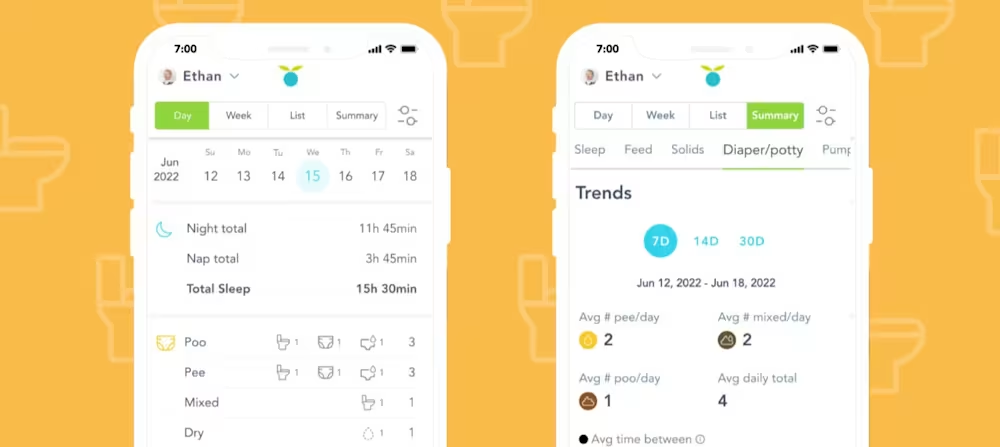How to help a constipated toddler: Causes, signs, remedies
Updated Jan 02, 2026

Toddlerhood is full of transitions and new beginnings, including , learning to use the word “no,” and starting preschool. It also comes with its fair share of challenges — like , picky eating, and constipation.
can be frustrating (for both of you!) and tricky to navigate, but we’re here to help! Keep reading for the common causes of constipation, ways to remedy it, and the best foods for keeping your little one regular.
Signs that your child is constipated
It’s likely that your child’s first sign of constipation is going to come from their diaper — or rather, lack of dirty diapers. If you’re racking your brain to remember the last time your toddler pooped, that may be your first clue that number two is about to become a number one concern.
Other symptoms to look out for include:
Going several days between bowel movements
Having a decreased appetite
Complaining of stomach pain
Experiencing hard or painful stools
Straining during a bowel movement
If you think your child might be constipated, you can try some of the home remedies discussed below to get them some relief. As always, if you have concerns, don’t hesitate to contact your child’s healthcare provider.
When to contact your pediatrician
According to the American Academy of Pediatrics [], you should call your pediatrician if your child doesn’t poop at least every 2 to 3 days or if they’re having pain while going to the bathroom. Other signs you should call the doctor include being constipated for more than 2 weeks, constipation interfering with normal activities, and/or consistently straining to have a bowel movement.

Causes of constipation in toddlers
The exact cause of constipation in toddlers can be hard to nail down. Oftentimes, it’s a combination of the factors listed below.
Not eating enough fiber
Eating enough fiber helps prevent constipation by moving food through the digestive system. Toddlers need around 14 grams of fiber a day for optimal health — but like adults, many fall short of the recommendation.
Being dehydrated
Water is also needed to move food and waste through the body. Without it, dehydration — and consequently, constipation — can occur.
Eating too many processed foods
While toddlers may love cheese crackers and chicken nuggets, these foods tend to be high in sodium and low in fiber, which may contribute to constipation as well.
Drinking too much milk
For some toddlers, drinking too much milk can cause or exacerbate constipation.
Changing routines
Any change in routine, such as a vacation, starting a new school, or , can impact a toddler’s bathroom habits. This can be due to feelings of stress or discomfort from something that’s new or unknown.
Not getting enough physical activity
Not getting enough exercise impacts digestion and makes constipation more likely.
Being sick
Certain illnesses, such as the flu or a stomach bug, can cause changes in appetite which may lead to constipation.
Purposely holding it in
Sometimes toddlers purposely order to avoid having to stop playing or if they are in an unfamiliar situation. This can also happen during potty training or if they’ve previously experienced pain while trying to poop.
Taking certain medications
Some medications, including iron supplements, can contribute to or worsen constipation in toddlers.

Does lactose intolerance cause constipation?
Lactose intolerance is a condition in which the body is unable to fully digest lactose, a sugar found in milk and dairy products, due to a deficiency of the enzyme lactase.
Typically, lactose intolerance doesn’t cause constipation, but it’s possible. If your child is lactose intolerant and experiencing uncomfortable digestive issues, they may gravitate toward simple, bland foods such as crackers, plain pasta, etc. These foods may then contribute to constipation as they are low in fiber.
More likely though, lactose intolerance would cause diarrhea. Check with your pediatrician if you think your child may be lactose intolerant.
Treatment for toddler constipation
Many times, constipation can be resolved and, in some part, even prevented with home remedies. Whether your little one is constipated or not, try to incorporate 1 or 2 of the following , snack, or movement ideas to keep everything moving along!
Increase fruit and veggies
Serve a fruit or veggie with each meal or snack if possible. Both are full of fiber and water, which help with optimal digestion. The “p” fruits — peaches, pears, plums, and prunes — are good for relieving constipation.
Decrease milk consumption
Milk causes constipation in some kiddos, so limit it to 16 - 24 ounces a day. If your child is currently experiencing constipation, consider cutting back even further until it resolves.
Offer water throughout the day
throughout the day helps keep constipation at bay. Keep a water bottle close by during playtime as well as at meals and snacks. Water-rich produce such as berries, cucumbers, and citrus fruits are hydrating as well.
Increase movement
Being physically active helps regulate digestion and move food through the body. Get outside to play or have a dance party in your living room!
Increase whole grains
Whole grains are another great way to increase fiber in your little one’s diet. Try toddler-friendly foods such as oatmeal, whole grain waffles, or whole grain pasta.
Make a smoothie
Smoothies are well-loved by toddlers! What’s even better is that they are an easy way to increase fruit (for example, ) and vegetable consumption and boost hydration. Add chia or flax seeds to up the fiber content without a noticeable difference in taste.
Foods to help a toddler poop
In general, offering foods that contain fiber, fluid, or probiotics tends to provide toddler constipation relief. These foods include fruits, vegetables, beans, whole grains, and fermented products such as the ones below. Remember, when increasing fiber-rich foods also make sure your child is drinking enough water.
Berries
Peaches
Pears
Plums
Raisins
Oats/oatmeal
Yogurt
Kefir
Chia seeds
Lentils
Beans
Cucumbers
Green peas
Mangos
Dates
Takeaway
You should call your pediatrician if your child doesn’t poop at least every 2 to 3 days or if they’re having pain while going to the bathroom.
Signs of constipation: infrequent bowel movements, pain, straining.
Causes of constipation: low fiber, dehydration, processed foods, routine changes, lack of activity, certain medications.
Treatments of constipation: increase fruits/veggies, reduce milk, offer water, promote movement, add whole grains, make smoothies.
Share article:
Note: The content on this site is for informational purposes only and should not replace medical advice from your doctor, pediatrician, or medical professional. If you have questions or concerns, you should contact a medical professional.
1 Sources
Share article:










